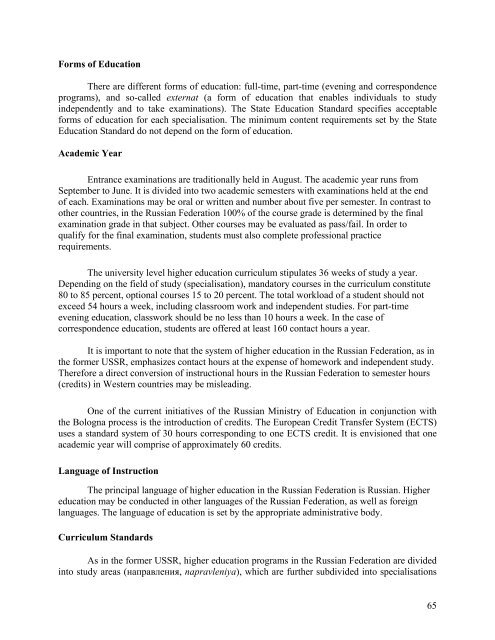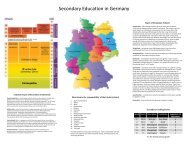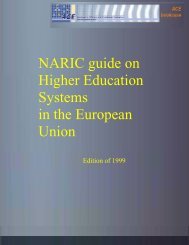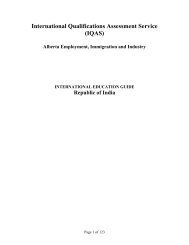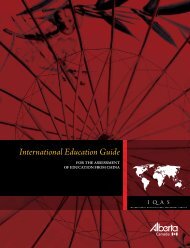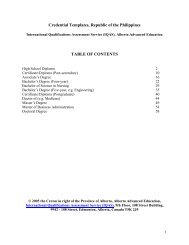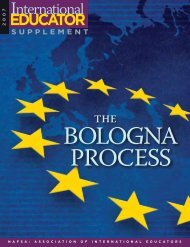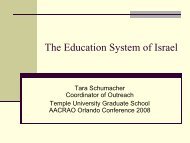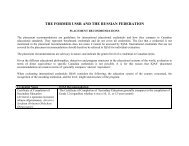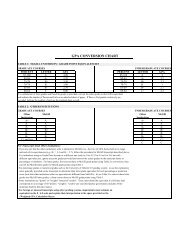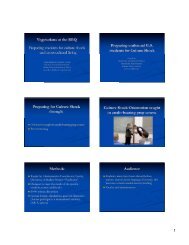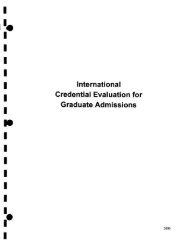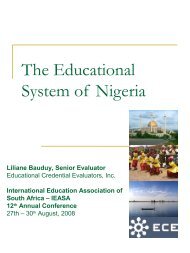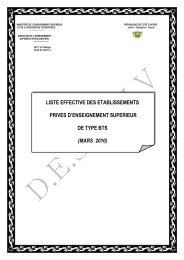Credential Templates, The Former USSR and the Russian Federation
Credential Templates, The Former USSR and the Russian Federation
Credential Templates, The Former USSR and the Russian Federation
Create successful ePaper yourself
Turn your PDF publications into a flip-book with our unique Google optimized e-Paper software.
Forms of Education<br />
<strong>The</strong>re are different forms of education: full-time, part-time (evening <strong>and</strong> correspondence<br />
programs), <strong>and</strong> so-called externat (a form of education that enables individuals to study<br />
independently <strong>and</strong> to take examinations). <strong>The</strong> State Education St<strong>and</strong>ard specifies acceptable<br />
forms of education for each specialisation. <strong>The</strong> minimum content requirements set by <strong>the</strong> State<br />
Education St<strong>and</strong>ard do not depend on <strong>the</strong> form of education.<br />
Academic Year<br />
Entrance examinations are traditionally held in August. <strong>The</strong> academic year runs from<br />
September to June. It is divided into two academic semesters with examinations held at <strong>the</strong> end<br />
of each. Examinations may be oral or written <strong>and</strong> number about five per semester. In contrast to<br />
o<strong>the</strong>r countries, in <strong>the</strong> <strong>Russian</strong> <strong>Federation</strong> 100% of <strong>the</strong> course grade is determined by <strong>the</strong> final<br />
examination grade in that subject. O<strong>the</strong>r courses may be evaluated as pass/fail. In order to<br />
qualify for <strong>the</strong> final examination, students must also complete professional practice<br />
requirements.<br />
<strong>The</strong> university level higher education curriculum stipulates 36 weeks of study a year.<br />
Depending on <strong>the</strong> field of study (specialisation), m<strong>and</strong>atory courses in <strong>the</strong> curriculum constitute<br />
80 to 85 percent, optional courses 15 to 20 percent. <strong>The</strong> total workload of a student should not<br />
exceed 54 hours a week, including classroom work <strong>and</strong> independent studies. For part-time<br />
evening education, classwork should be no less than 10 hours a week. In <strong>the</strong> case of<br />
correspondence education, students are offered at least 160 contact hours a year.<br />
It is important to note that <strong>the</strong> system of higher education in <strong>the</strong> <strong>Russian</strong> <strong>Federation</strong>, as in<br />
<strong>the</strong> former <strong>USSR</strong>, emphasizes contact hours at <strong>the</strong> expense of homework <strong>and</strong> independent study.<br />
<strong>The</strong>refore a direct conversion of instructional hours in <strong>the</strong> <strong>Russian</strong> <strong>Federation</strong> to semester hours<br />
(credits) in Western countries may be misleading.<br />
One of <strong>the</strong> current initiatives of <strong>the</strong> <strong>Russian</strong> Ministry of Education in conjunction with<br />
<strong>the</strong> Bologna process is <strong>the</strong> introduction of credits. <strong>The</strong> European Credit Transfer System (ECTS)<br />
uses a st<strong>and</strong>ard system of 30 hours corresponding to one ECTS credit. It is envisioned that one<br />
academic year will comprise of approximately 60 credits.<br />
Language of Instruction<br />
<strong>The</strong> principal language of higher education in <strong>the</strong> <strong>Russian</strong> <strong>Federation</strong> is <strong>Russian</strong>. Higher<br />
education may be conducted in o<strong>the</strong>r languages of <strong>the</strong> <strong>Russian</strong> <strong>Federation</strong>, as well as foreign<br />
languages. <strong>The</strong> language of education is set by <strong>the</strong> appropriate administrative body.<br />
Curriculum St<strong>and</strong>ards<br />
As in <strong>the</strong> former <strong>USSR</strong>, higher education programs in <strong>the</strong> <strong>Russian</strong> <strong>Federation</strong> are divided<br />
into study areas (направления, napravleniya), which are fur<strong>the</strong>r subdivided into specialisations<br />
65


